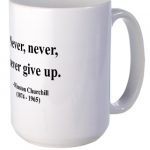All hail Sarah Ellison of Vanity Fair.
Yesterday, VF published a lengthy interview she had with New York Times publisher Arthur Sulzberger Jr. Before zeroing in on the publisher and his decision to fire Executive Editor Jill Abramson, Ms. Ellison paused in her second paragraph to expose the shallowness of a framed quotation attributed to Winston Churchill that the publisher keeps on a side table in his office. The quotation in the frame is “Never never never give up.”
She is not the first, nor will she be the last to do so, but she took the time to point out a truism among quotations: Shorter quotations are not neccessarily better (or more accurate) quotations. The five-word outburst might sound like Churchill (blunt, gruff, needing a smoke). But it reduces him to mere froth. Sarah Ellison includes (and Vanity Fair editors decided to keep it) the real quotation:
Of course that cannot possible fit on a coffee mug. (ONE RULE REGARDING QUOTATIONS: If the quotation can fit on the side of a coffee mug, be wary. Something might be missing!) (The mug at right is available NOW on the Internet!)“Never give in, never, never, never–never, in nothing, great or small, large or petty–never give in except to convictions of honor and good sense.”
And, in a smallish frame on a side-table the type might be too small to read quickly and comfortably. Therefore Churchill’s statement is snipped and cut and ruined all for the sake of snappiness.
Ms Ellison presents an accurate version of the immediate context of what Churchill said during a 20-minute speech at Harrow School on October 29, 1941. You can hear a slightly fuller version on this YouTube clip. This clip includes an extra “never give in” in the beginning and adds two other short, relevant sentences afterward:
“Never give in. Never give in. Never, never, never, never–in nothing great or small, large or petty–never give in, except to convictions of honour and good sense. Never yield to force. Never yield to the apparently overwhelming might of the enemy.”
Before the statement, he said “this is the lesson” learned from the previous ten-month period during which “very terrible catastrophic events in the world” threatened Britain and others, thanks to the attacks by Nazi Germany. (Remember, this is before Pearl Harbor.)
The framed version in the publisher’s office is a horrible disservice. As framed, “Never never never give up” offers a blank check to a stubborn, selfish, unwise approach to a problem. Visually, here’s how the framed version compares to the real one–with the frame’s words in bold face:
“Never give in. Never give in. Never, never, never, never–in nothing great or small, large or petty–never give
in[change to “up”], except to convictions of honour and good sense. Never yield to force. Never yield to the apparently overwhelming might of the enemy.”
Yes, there’s quite a lot missing. (I mean, at least give Churchill the fourth “never” for goodness’ sake.)
To me, Churchill’s whole quote offers a more subtle, nuanced approach to the challenge of what it means to stand up for what you think is right. The key, to me, is the word “EXCEPT.” He puts “honor” and “good sense” front and center. That’s where the roots of “never give in” should lie. Absent “good sense” and “honor,” a “Never never never give up” rallying cry should fall on deaf ears.
By leaving out the context–that the stick-to-your-guns and go-down-with-the-ship mentality must be rooted in “honor” and “good sense,” Churchill’s statement has become oversimplified and “strengthened.” I would call this a “steroid” treatment.
And, of course, we must bear in mind the over-arching context of the quotation: WAR. Britain was at WAR. The never-give-in principle might not be so easy to apply in the vast majority of situations–for example, marital and familial discussions.
Then again, maybe all this is off point. After all, “give in” is very different from “give up.”
Or, for that matter, discussions in, say, a newsroom.


